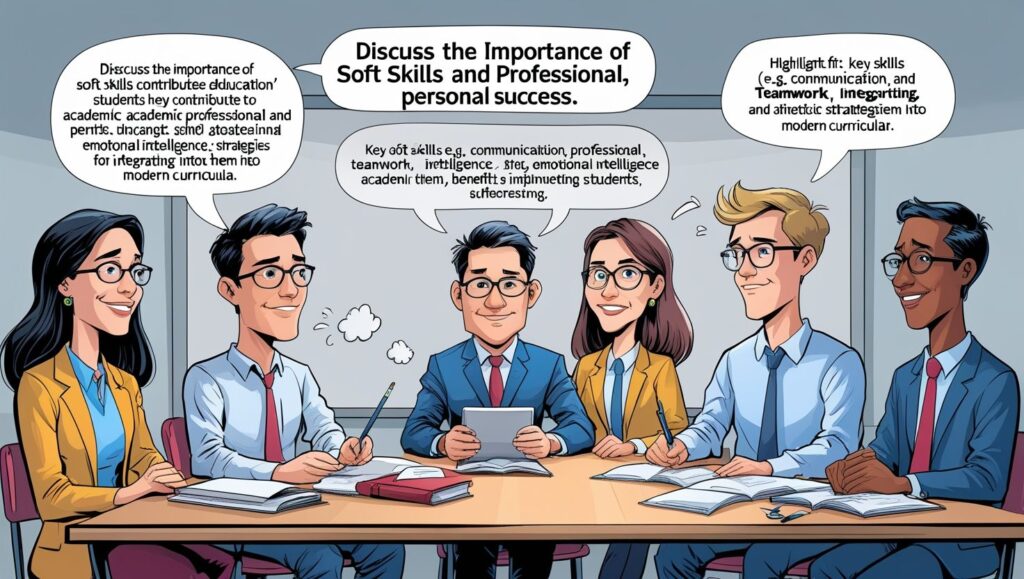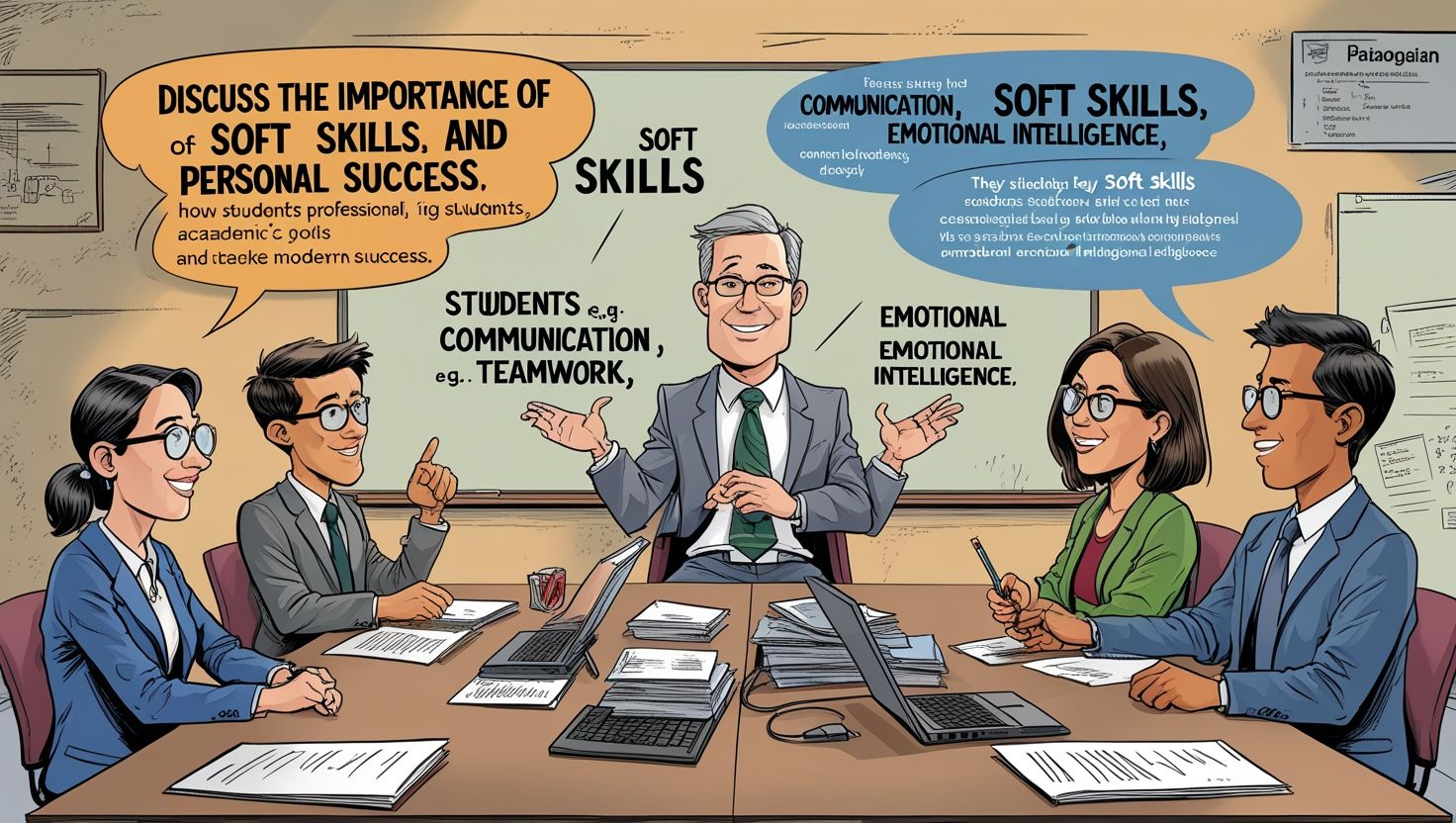Abstract
The Importance of Soft Skills in Education, In the rapidly evolving global landscape, education systems must adapt to equip students with not only technical knowledge but also essential soft skills. Soft skills—such as communication, teamwork, critical thinking, and emotional intelligence—are increasingly recognized as vital for personal and professional success. This article explores the role of soft skills in education, their benefits, challenges in implementation, and strategies for integrating them into curricula. Drawing on contemporary research, this paper argues that fostering soft skills alongside academic competencies is crucial for preparing students to thrive in an interconnected, dynamic world.
Keywords: Soft skills, education, 21st-century skills, communication, emotional intelligence, critical thinking
1. Introduction
The traditional education system has long emphasized cognitive abilities and subject-specific knowledge, often overlooking the importance of interpersonal and intrapersonal skills. However, as workplaces and societies become more collaborative and technology-driven, the demand for soft skills has surged. Employers now prioritize candidates who can communicate effectively, adapt to change, and work well in teams (Heckman & Kautz, 2012).
Soft skills—also referred to as “non-cognitive skills,” “life skills,” or “21st-century skills”—encompass a range of abilities that influence how individuals interact with others and navigate challenges. These include:
- Communication (verbal and written)
- Collaboration and teamwork
- Critical thinking and problem-solving
- Emotional intelligence (self-awareness, empathy, resilience)
- Creativity and adaptability
This article examines why soft skills are essential in education, how they contribute to student success, and the best practices for teaching them effectively.
2. The Growing Importance of Soft Skills in Education
2.1 Workforce Demands
The modern job market requires more than technical expertise. A report by the World Economic Forum (2020) identified critical thinking, emotional intelligence, and complex problem-solving as among the top skills needed for future jobs. Automation and artificial intelligence (AI) are replacing routine tasks, making human-centric skills more valuable (Deming, 2017).
2.2 Academic and Social Benefits
Research indicates that students with strong soft skills perform better academically. For example:
- Effective communication enhances classroom participation and comprehension.
- Teamwork fosters peer learning and reduces behavioral issues.
- Emotional intelligence improves mental health and reduces dropout rates (Durlak et al., 2011).
2.3 Global and Civic Competence
In an interconnected world, soft skills enable students to engage with diverse cultures, resolve conflicts, and contribute meaningfully to society. UNESCO (2019) highlights the role of education in fostering global citizenship, where empathy and collaboration are essential.
3. Challenges in Teaching Soft Skills
Despite their importance, integrating soft skills into education faces several obstacles:
3.1 Lack of Standardized Assessment
Unlike math or science, soft skills are difficult to quantify. Standardized tests rarely measure creativity or emotional resilience, leading schools to deprioritize them (Pellegrino & Hilton, 2012).
3.2 Teacher Preparedness
Many educators lack training in teaching soft skills. Professional development programs must equip teachers with strategies to nurture these competencies.
3.3 Curriculum Constraints
With rigid academic requirements, schools struggle to allocate time for soft skill development. Policymakers must advocate for balanced curricula that include both hard and soft skills.

4. Strategies for Integrating Soft Skills in Education
4.1 Project-Based Learning (PBL)
PBL encourages collaboration, problem-solving, and creativity. Students work on real-world projects, applying knowledge while developing interpersonal skills (Thomas, 2000).
4.2 Social-Emotional Learning (SEL) Programs
SEL curricula, such as CASEL’s framework, teach self-awareness, relationship skills, and responsible decision-making (Collaborative for Academic, Social, and Emotional Learning, 2021).
4.3 Role-Playing and Simulations
Interactive activities, such as debates and mock negotiations, enhance communication and critical thinking.
4.4 Teacher Modeling and Mentorship
Educators who demonstrate empathy, active listening, and adaptability inspire students to emulate these behaviors.
4.5 Parent and Community Involvement
Families and local organizations can reinforce soft skills through extracurricular activities, volunteer work, and mentorship programs.
5. Case Studies and Evidence of Success
5.1 Finland’s Holistic Education Model
Finland’s education system emphasizes collaboration over competition, integrating SEL into daily lessons. Finnish students consistently rank high in academic performance and well-being (Sahlberg, 2015).
5.2 Singapore’s “21st-Century Competencies” Framework
Singapore’s Ministry of Education incorporates communication and civic literacy into its curriculum, preparing students for a globalized economy (Tan, 2016).
5.3 SEL in U.S. Schools
A meta-analysis by Durlak et al. (2011) found that SEL programs improved academic performance by 11%, alongside reductions in anxiety and aggression.
6. Future Directions and Recommendations
To fully integrate soft skills into education, stakeholders should:
- Develop measurable frameworks for assessing soft skills.
- Train teachers in SEL and student-centered pedagogies.
- Revise national curricula to balance academic and life skills.
- Encourage partnerships between schools, businesses, and communities.
7. Conclusion
Soft skills are no longer optional—they are fundamental to student success in education, careers, and life. While challenges exist, innovative teaching methods and policy reforms can ensure that learners develop the competencies needed for the 21st century. By prioritizing soft skills, educators can cultivate resilient, empathetic, and adaptable individuals ready to tackle future challenges.
References
- Deming, D. J. (2017). “The Growing Importance of Social Skills in the Labor Market.” Quarterly Journal of Economics.
- Durlak, J. A., et al. (2011). “The Impact of Enhancing Students’ Social and Emotional Learning.” Child Development.
- Heckman, J. J., & Kautz, T. (2012). “Hard Evidence on Soft Skills.” Labour Economics.
- Pellegrino, J. W., & Hilton, M. L. (2012). Education for Life and Work: Developing Transferable Knowledge and Skills in the 21st Century. National Academies Press.
- World Economic Forum. (2020). The Future of Jobs Report.

fk2xv1
Good shout.
thc microdose gummies area 52
thc gummies for sleep area 52
thca vape area 52